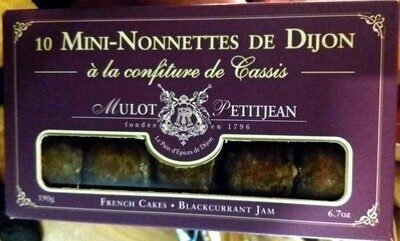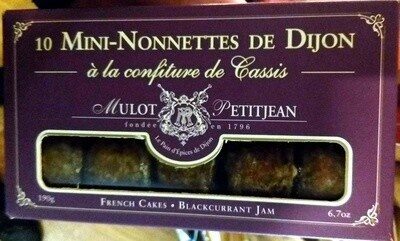10 mini-nonnettes de Dijon - Mulot Petitjean - 190 g
This product page is not complete. You can help to complete it by editing it and adding more data from the photos we have, or by taking more photos using the app for Android or iPhone/iPad. Thank you!
×
Barcode: 3760129921149 (EAN / EAN-13)
Common name: Boite de 18 mini nonnettes fourrées à la confiture de cassis
Quantity: 190 g
Packaging: Plastic, Box, Cardboard
Brands: Mulot Petitjean
Categories: Snacks, Sweet snacks, Biscuits and cakes, Cakes, Filled cakes, fr:Nonnettes
Labels, certifications, awards:
Green Dot, Made in France, Triman

Manufacturing or processing places: France, Dijon
Traceability code: EMB 21231B - Dijon (Côte-d'Or, France)
Stores: carrefour.fr
Countries where sold: France
Matching with your preferences
Environment
Packaging
Transportation
Report a problem
Data sources
Product added on by sebleouf
Last edit of product page on by packbot.
Product page also edited by beniben, driveoff, kiliweb, moon-rabbit, openfoodfacts-contributors, yuka.sY2b0xO6T85zoF3NwEKvlk9kftmGmwmZHgf6m0eU5c2vD5fwb4FR25XCH6s.






